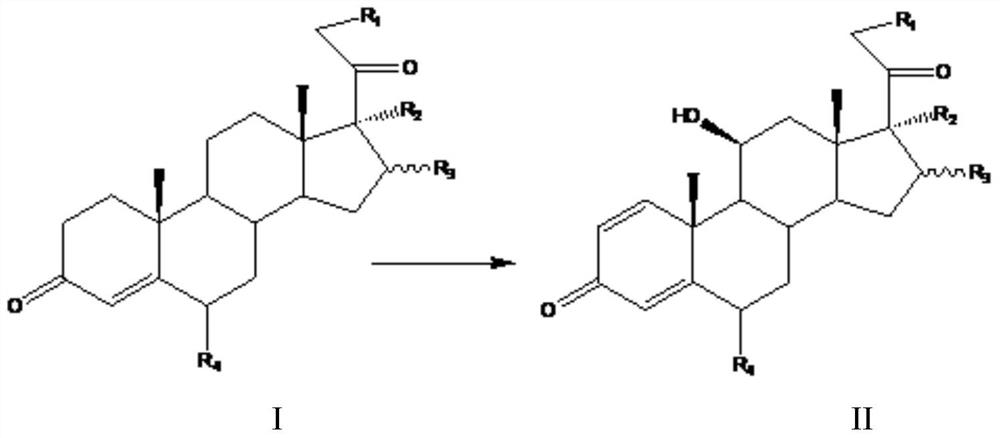Preparation of 11β-hydroxy-1,4-diene-3,20-dione steroids by joint fermentation of Absidia and Arthrobacter
A combined fermentation and compound technology, applied in fermentation, microbial-based methods, microorganisms, etc., can solve difficult problems such as large enzyme activity
- Summary
- Abstract
- Description
- Claims
- Application Information
AI Technical Summary
Problems solved by technology
Method used
Image
Examples
Embodiment 1
[0065] The selection of embodiment 1 fermentation medium
[0066] In the following examples, the influence of the fermentation medium on the conversion rate of the target product was examined. Incline, seed cultivation method as described in the summary of the invention.
Embodiment 1-1
[0068] In 1L of water, the fermentation substrate RSA 10g, the components of the fermentation medium glucose 15g, peptone 5g, corn steep liquor 30g, ammonium nitrate 2g, potassium dihydrogen phosphate 5g, foam enemy 0.4g, pH 6.0. For the secondary culture of Arthrobacter simplex, after 24 hours of primary seed culture, insert 10% of the inoculum into the secondary seed medium, and after 22 hours of secondary culture, insert 15% of the inoculum into the above fermentation medium ; After 24 hours of culturing the primary seeds of Absidia indigo, they were inserted into the above-mentioned fermentation medium according to 30% inoculum amount. Use a 30L fermenter for conversion, with a liquid volume of 80%, a tank pressure of 0.05MPa, and an air flow of 40m 3 / hr, temperature 28°C, stirring 180rpm, conversion for 72 hours, sampling by TLC analysis, the conversion of the substrate was complete, the sample was extracted with ethyl acetate, the upper layer was sent to HPLC, the predn...
Embodiment 1-2
[0071] The components of the fermentation medium are 30 g of glucose, 5 g of peptone, 30 g of corn steep liquor, 2 g of ammonium nitrate, 5 g of potassium dihydrogen phosphate, 0.4 g of dihydrogen phosphate, and the pH is 6.0. Other conditions are the same as in Example 1-1.
[0072] After TLC analysis, the conversion of the substrate was complete, the sample was extracted with ethyl acetate, and the upper layer was sent to HPLC, the prednisolone content was 77.1%.
[0073] After the conversion is complete, the fermentation broth is inactivated at 85°C, cooled to room temperature, and filtered with suction. The filter cake was extracted with ethyl acetate and concentrated to obtain white crystals with a crude product yield of 89.2% and a prednisolone content of 78.4%.
PUM
 Login to View More
Login to View More Abstract
Description
Claims
Application Information
 Login to View More
Login to View More - R&D
- Intellectual Property
- Life Sciences
- Materials
- Tech Scout
- Unparalleled Data Quality
- Higher Quality Content
- 60% Fewer Hallucinations
Browse by: Latest US Patents, China's latest patents, Technical Efficacy Thesaurus, Application Domain, Technology Topic, Popular Technical Reports.
© 2025 PatSnap. All rights reserved.Legal|Privacy policy|Modern Slavery Act Transparency Statement|Sitemap|About US| Contact US: help@patsnap.com



